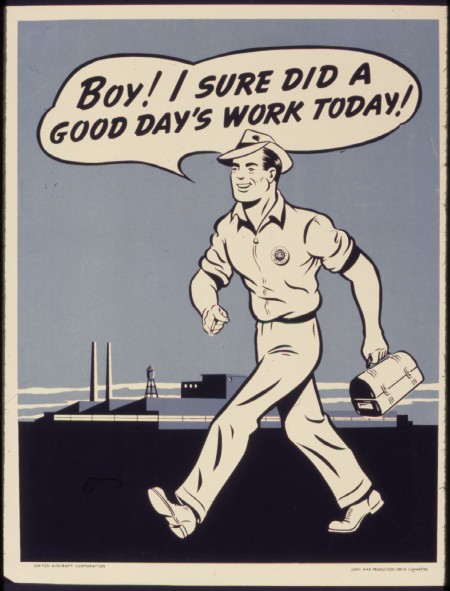Work, leisure and the self

As I anticipate writing yet another post on technology and the robotizing of the workforce, it occurs to me that I should perhaps say something about what this has to do with the self and why this subject interests me.
One very obvious observation is that — for almost everyone — work (employment) not only occupies most of our waking hours, but is a major component of our identity. And identity, of course, is a significant aspect of the self. Being involuntarily unemployed, for example, has a negative impact on our sense of self. Being a successful career professional (doctor, lawyer, architect, academic, hedge fund manager), as opposed to working at MacDonald’s for a minimum wage, is one of the ways we Americans segregate people into social classes. Social class — which relates to social status — affects how we feel about ourselves when we compare ourselves to others, as we inevitably do. (Social class is highly correlated with, but not identical to, social status. You can be from an elite social class, but if you murder your wife, your social status will decline.) I don’t think I need to say any more than this to make the case that work is relevant to issues of the self.
I’m interested in how our sense of self — how we regard ourselves — has changed over the course of the 20th century. Ever since I read Vanity: 21st Century Selves last year — where I was relentlessly confronted with what’s involved in being a self these days — I’ve been seeking explanations for how we ended up with the type of self we have today. I’d characterize this self as being so thoroughly psychologized that we can’t imagine not being preoccupied with (and this is the subject matter of Vanity) our self-esteem, our social status, the attractiveness of our bodies, the youthfulness of our appearance, and how many Facebook friends we have.
We are — as Nikolas Rose puts it — obliged to be free. We’re free to understand our past and our future as solely the result of our personal choices (as opposed to our social, cultural and historical circumstances). We’re free to realize that those choices are expressions of our personality (which we are expected to create and display in order to optimize our opportunities in life). And we’re free to accept that the only real freedom we have is to aspire to maximum self-fulfillment.
 The image of the laborer with his lunchbox at workday’s end, smiling and feeling good because “Boy, I sure did a good day’s work today,” is from World War II. It was part of an effort to influence the public’s attitude towards jobs that was essential to the war effort. Some seventy years later, the idea of motivating employees by appealing to their desire to contribute to something larger than their individual selves is a distant memory. The image, as well as how governments attempt to influence the public, has changed. Today, to be successful in our work lives, we must take responsibility for empowering ourselves, and it’s assumed we ardently desire self-actualization. The government does not need to remind us of this because — thanks to the psychologizing of the self — we have thoroughly internalized this message. This is only one of many ways in which 20th century developments in psychology have affected our work lives.
The image of the laborer with his lunchbox at workday’s end, smiling and feeling good because “Boy, I sure did a good day’s work today,” is from World War II. It was part of an effort to influence the public’s attitude towards jobs that was essential to the war effort. Some seventy years later, the idea of motivating employees by appealing to their desire to contribute to something larger than their individual selves is a distant memory. The image, as well as how governments attempt to influence the public, has changed. Today, to be successful in our work lives, we must take responsibility for empowering ourselves, and it’s assumed we ardently desire self-actualization. The government does not need to remind us of this because — thanks to the psychologizing of the self — we have thoroughly internalized this message. This is only one of many ways in which 20th century developments in psychology have affected our work lives.
I have been reading lately about the history of psychology. This may be why psychology is on the top of my mind when I think about work. I’m trying to locate and understand the many possible explanations for how we (in Western society) ended up with what seems to me a not very attractive or even desirable self. The 20th century is a complex web of economic, social and political events that have interacted with the psychological. One could argue, however, that the psychology profession made sure to have its foot in the door whenever it came to reconceptualizing such fundamental social institutions as the family, childhood, education, and the workplace, as well as the individual.
The leisure society
Modern technique has made it possible for leisure, within limits, to be not the prerogative of small privileged classes, but a right evenly distributed throughout the community. The morality of work is the morality of slaves, and the modern world has no need of slavery. (Bertrand Russell (1932))
In the 1970s, futurists speculated that technology was creating a world in which there would be a great deal of leisure. The biggest problem they anticipated was that we would fail to have enough activities to fill all those hours of “free” time. Looking back, I suppose this seems hopelessly naive, but this was before the two-income family became a necessity, before the success of neoliberal ideas, and before globalization became a household word.
Much has changed economically, politically and socially since the 1970s. In the ’70s, governments had only recently been favorable to policies that distributed social justice. The utopian ideals of the ’60s were still fresh in our minds. Greed did not seem as rampant — or at least did not receive as much publicity — as it does now.
Recently we’ve begun to discuss economic inequality, but will that discussion last? Will it produce any changes? Everyone who comments on Piketty’s solutions for economic inequality seems to agree they are entirely unrealistic (an optimal top tax rate of 80% on income and a 10% tax on wealth). Not only are the 1% — with the help of the Supreme Court — able to elect politicians who protect their interests. Consultants for big retailers (Nike, Macy’s, Crate & Barrel) give talks to executives with slides that say “How aggressive can we be?” in opposing any increase in the minimum wage. There’s also a slide that says: “How do we challenge the social justice narrative?” (That one really galls me. How blatant and shameless can you be?) The only increase in leisure we’re apt to see in the near future will come from higher unemployment among the poor.
This is not subject matter in which I have any expertise, so I’ll just mention three things I regularly come across when these issues are discussed. One is that, above a certain income level, one can no longer afford to desire leisure. Certain essentials of one’s lifestyle — especially things such as childcare, private schools, and college tuition — are too expensive. In the working conditions made possibly by a digitally connected society, one becomes extremely reluctant to forego the income that would be lost by an hour of not working.
At the other end of the economic spectrum, there’s the basic idea that workers need to earn enough money to purchase the goods and services that create wealth for those who reap the profits. Perhaps, it’s suggested, business leaders are intelligent enough that they won’t let things get out of hand. They may not be especially concerned about those who live in poverty, and they may blame the poor for being deficient in personal responsibility, but ultimately it’s not in their interest for these consumers to reduce their consumption.
Lastly, there’s the historical precedent of social unrest in response to horrid and unjust living conditions. Periodically this has been a matter of political concern. Is this something politicians and think tanks anticipate today? Who knows? No one in the defense or intelligence communities (other than an Edward Snowden, and look where he is now) is going to reveal the existence of contingency plans. To speculate on such things is to risk being labeled paranoid and invite prescriptions for psychopharmaceuticals.
In praise of idleness
Work kills the spirit, damages the body, insults the mind, keeps everyone confused and demoralized, distracts its victims from all the things that really matter in life… Our struggle calls for labor organizers of a new kind… To bring about the meltdown of miserabilism, we need awakeners of latent desires, fomentors of marvelous humour, stimulators of ardent dreams, provokers of the deepest possible yearning for a life of poetic adventure. (Penelope Rosemont (2000))
I intended to reflect here on my own relationship to work, but this post has become too long. I’ve already talked about some of my employment history in a previous post. I’ve discussed my underlying obstacle to having a socially desirable attitude towards work in connection with my Chinese horoscope. In brief, I haven’t had a career path, and I never aspired to the idea of having one. There were years when I felt challenged and stimulated to be doing what I was being paid to do. But there were too many years in which I viewed employment as simply a job that kept me from what I would have much preferred to be doing.
Anyway, that should be enough for now on why I’m writing about work in a blog on the self.
The Leisure Society – Fight for Everyone
Update June 27, 2014: Since writing this post, I have discovered a recent and very enlightening book that discusses John Maynard Keynes’ anticipation of a society of leisure: Revisting Keynes: Economic Possibilities for our Grandchildren. More to come.
Related posts:
Do what you love: The obligation to find one’s true calling
Economic losers of the world unite! When work becomes robotic
My so-called writing life
Can we think outside our culture: My Chinese horoscope
Teaching the oligarchy not to care
Image sources:
World War II poster: Wikimedia Commons
Man with computer on mountain top: My Super-Charged Life
References:
Claire Tanner, JaneMaree Maher and Suzanne Fraser, Vanity: 21st Century Selves
Bertrand Russell, In praise of Idleness, first published in Harper’s Magazine (1932), reprinted in Vernon Richards (editor), Why Work? Arguments for the Leisure Society
Lee Fang, War on Workers, The Nation, May 19, 2014, pp 30 – 33
Penelope Rosemont, The Psychopathology Of Work, a chapter in Surrealist Experiences: 1001 Dawns, 221 Midnights (the entire chapter is available online at The Anarchist Library)

Sorry, comments are closed for this post.